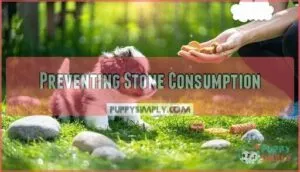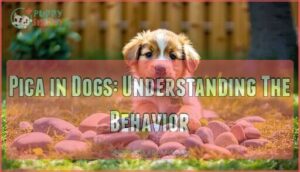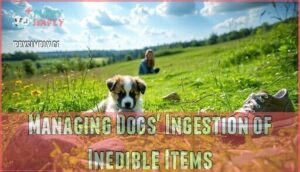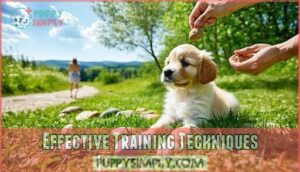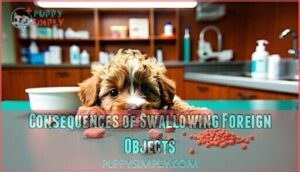This site is supported by our readers. We may earn a commission, at no cost to you, if you purchase through links.
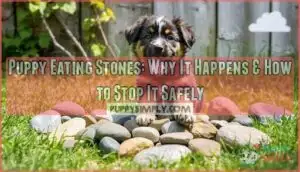
While some puppies experiment with textures during exploration, persistent rock-chomping can signal deeper issues like anxiety or mineral deficiencies that need attention. The risks are real: intestinal blockages, broken teeth, and internal injuries can turn a seemingly innocent habit into an emergency vet visit.
Understanding what drives this behavior and how to redirect it safely will help you protect your puppy from harm while addressing the root cause.
Table Of Contents
- Key Takeaways
- Reasons Behind Stone Ingestion
- Preventing Stone Consumption
- Addressing Swallowed Stones
- Pica in Dogs: Understanding The Behavior
- Managing Dogs’ Ingestion of Inedible Items
- Curbing Dogs’ Appetite for Non-Food Items
- Recognizing Symptoms of Ingested Objects
- Effective Training Techniques
- Consequences of Swallowing Foreign Objects
- Seeking Professional Help and Safety Measures
- Frequently Asked Questions (FAQs)
- Will eating stones harm my puppy?
- How do I get my puppy to stop eating rocks?
- Why is my 8 week old puppy eating rocks?
- What if my puppy swallowed a small stone?
- Can stone eating affect a puppys dental health?
- What are long-term effects of repeated stone ingestion?
- How do veterinarians diagnose stone-related health issues?
- Are certain environments riskier for stone eating?
- Can stone eating behavior return after being stopped?
- Can stomach acid dissolve swallowed stones completely?
- Conclusion
Key Takeaways
- Stone eating in puppies stems from teething pain (68% of cases occur during the 3-6 month teething phase), nutritional deficiencies (making them nearly three times more likely to eat stones), boredom, or pica—a compulsive disorder linked to anxiety or mineral gaps.
- Swallowed stones cause serious complications including intestinal blockages (20-37% require surgery), dental fractures, internal bleeding, and perforation that can lead to life-threatening infections, with mortality rates reaching 75% for esophageal surgical cases.
- Prevention requires multiple approaches: balanced AAFCO-standard nutrition to address deficiencies, mental stimulation and exercise to combat boredom (which drives 60% of behavioral pica cases), and teaching the "leave it" command through consistent positive reinforcement training.
- Immediate veterinary care is essential if your puppy swallows stones—watch for vomiting lasting over 24 hours, abdominal tenderness, lethargy, or refusal to eat, as blockages can develop within 24 hours and demand emergency intervention.
Reasons Behind Stone Ingestion
Puppy eating stones isn’t just random mischief—it’s often driven by real discomfort or need. Teething pain between 3 to 6 months sends puppies searching for relief, and 68% of those munching stones are actively teething. Nutrient deficiency plays a role too; puppies on incomplete diets are nearly three times more likely to eat stones. Boredom behavior and lack of exercise account for roughly one-fifth of cases.
Some pups develop pica—compulsive eating of non-food items—linked to anxiety, medical conditions like intestinal parasites, or dietary deficiencies.
Understanding whether it’s teething, nutritional gaps, or behavioral triggers helps you address stone eating before it becomes a health crisis. It’s vital to investigate potential nutritional deficiency causes to provide appropriate care.
Preventing Stone Consumption
Stopping your puppy from eating stones requires a proactive approach that tackles the root causes we’ve covered.
The strategies below tackle nutrition, environment, training, and breed-specific needs to keep your pup safe.
Let’s walk through the most effective prevention methods you can start using today.
Balanced Nutrition
Your puppy’s bowl could be the key to stopping those worrying rock-munching sessions. When dogs develop pica—a condition where they eat nonfood items like stones—nutrition deficiency often plays a starring role. Up to 18% of stone-eating incidents can be traced back to dietary deficiencies or imbalanced meals.
Quality puppy food that meets AAFCO standards delivers the nutrient balance your growing dog craves. Without adequate calcium, protein, and essential minerals, puppies may instinctively forage for what’s missing, sometimes in all the wrong places.
Consider these nutrition essentials:
- Complete formulas designed specifically for puppies, not adult dogs
- High-quality protein sources supporting rapid tissue development
- Balanced minerals including iron, zinc, and calcium to prevent deficiencies
- Consistent feeding schedules preventing hunger-driven scavenging
Healthy digestion starts with meeting your puppy’s dietary needs through food quality that supports ideal growth. If stone-eating persists despite balanced nutrition, consult your vet—chronic nutritional deficiencies may require targeted supplementation to resolve the behavior completely.
Combatting Boredom
Even the most well-fed puppy can develop a taste for trouble when hours of inactivity stretch on with nothing to do. Boredom drives nearly 60% of behavioral pica cases, turning ordinary stones into entertainment. Without proper mental stimulation and physical activity, your pup’s natural curiosity shifts toward whatever’s available—including rocks in your yard.
Combat this habit with purposeful enrichment:
- Interactive Toys – Puzzle feeders and treat-dispensing balls challenge problem-solving skills
- Play Activities – Rotate fetch, tug-of-war, and hide-and-seek games daily
- Mental Stimulation – Practice obedience training and teach new tricks regularly
- Social Engagement – Arrange puppy playdates or supervised group activities
Environmental enrichment transforms restless energy into productive exploration, making stones far less appealing than engaging alternatives.
Breed-Specific Considerations
Certain breeds seem hardwired to pick up anything that fits in their mouth—including the stones you’d rather they left alone. Retrievers and Spaniels top the list, driven by genetic predispositions to carry objects constantly. These canine instincts don’t vanish just because you’re watching.
Border Collies and German Shepherds often exhibit stone eating when their breed traits demand more mental challenge than they’re getting. Understanding these hereditary factors helps you anticipate breed-specific considerations before puppy behavior becomes a veterinary emergency.
High-energy breeds need targeted activities that satisfy their natural drives—otherwise, your gravel becomes their outlet.
Teething Solutions
Those tiny teeth might be breaking through, but that doesn’t mean stones get a free pass as teething toys. Puppy teething demands safe alternatives that soothe without endangering your pup. Frozen chew toys numb sore gums while satisfying the urge to gnaw—far better than rocks that can shatter teeth or lodge in their throat.
Preventing stone eating starts with smart substitutes:
- Cold compress options like frozen washcloths knotted at the ends
- Relief chews specifically formulated for puppy teething pain
- Teething gels applied to gums before outdoor time reduces stone temptation
Redirect immediately when you catch your puppy eyeing gravel—these teething solutions protect them through this uncomfortable phase.
Training Leave It Command
One simple command stands between your puppy and a dangerous mouthful of gravel. Teaching "leave it" through consistent command training transforms risky moments into puppy obedience wins. Start with high-value treats, say "leave it" firmly, and reward your pup when they ignore the stone.
Practice this canine discipline daily—in your yard, on walks, anywhere temptation lurks. Reward systems work: your puppy learns that listening beats scavenging.
With patience and proper dog training, that dangerous habit fades as your puppy’s training and behavior improves.
Addressing Swallowed Stones
Emergency action beats regret when your puppy swallows stones. Contact your veterinarian immediately—don’t wait for symptoms to worsen. Watch for signs of intestinal obstruction: vomiting, lethargy, loss of appetite, or abdominal pain. These signal serious internal damage requiring emergency care.
Your vet will perform veterinary diagnosis through X-rays to locate swallowed stones and assess the risk. Stone retrieval may involve endoscopic removal for smaller objects, but surgical intervention becomes necessary in 20–37% of cases when stones cause blockages.
Pica in dogs often underlies repeated stone eating, so addressing swallowed stones is just the first step—you’ll need to tackle the root behavior to prevent future emergencies.
Pica in Dogs: Understanding The Behavior
When your puppy treats stones like snacks, you’re likely dealing with pica—a condition where dogs compulsively eat things that aren’t food. This behavior isn’t just stubbornness or curiosity gone wild; it often signals something deeper going on.
Let’s break down what’s actually driving this stone-eating habit so you can tackle it at the root.
Curiosity and Exploration
Your puppy’s mouth is their primary tool for discovering the world—every stone becomes a science experiment in texture and taste. This exploratory behavior reflects normal sensory development, though it carries real risks when those experiments involve rocks. Puppies under six months rely heavily on object investigation to learn about their environment, which explains why curiosity often leads to stone eating. Understanding this phase helps you create appropriate environmental enrichment while managing pica in dogs.
- Texture mapping – Puppies learn physical properties through mouthing different surfaces and materials
- Temperature testing – Cool stones feel interesting against teething gums during exploration
- Taste sampling – Residual scents on rocks trigger investigative licking and chewing
- Size assessment – Puppies determine what fits in their mouths through trial and error
- Sound discovery – Clacking stones together creates auditory feedback that fascinates young dogs
Proper puppy socialization and redirecting this exploratory behavior toward safe toys prevents stone eating from becoming a dangerous habit. Recognizing pica disorder symptoms is essential for dog owners to address the issue effectively.
Boredom as a Trigger
When your puppy’s day lacks mental stimulation and environmental enrichment, stones become makeshift toys—boredom as a trigger drives this risky behavior. Nearly 60% of pica cases stem from behavioral causes like insufficient play therapy and lack of canine entertainment.
You’ll notice puppy eating stones escalates when routine exercise drops or interactive challenges disappear. Combat this with puzzle feeders, scent games, and rotating toys that provide stress reduction through engagement.
Without proper outlets, stone eating transforms from curiosity into a compulsive habit, making preventing unhealthy habits essential through consistent enrichment strategies that exhaust both body and mind.
Dietary Deficiencies and Compulsions
When your vet finds nutritional deficiencies, it’s not just about what’s missing from the bowl—it’s about what your puppy’s body can actually use. Up to 59% of pica cases, including puppy eating stones, trace back to dietary deficiencies that create desperate cravings for minerals their system lacks.
Here’s what drives compulsive eating and nutrient imbalance:
- Gut health disruption prevents proper absorption of essential vitamins, even from quality food
- Mineral deficiency triggers stone-seeking as your pup instinctively hunts for calcium or iron
- Unbalanced diets—whether homemade or low-grade commercial—leave critical nutritional gaps that fuel pica
- Chronic enteropathies create a vicious cycle where intestinal issues worsen nutrition deficiency
Dietary therapy works. Studies show correcting these imbalances reduces stone-eating by 72%. Your vet can run bloodwork to pinpoint specific deficiencies and recommend targeted supplementation that tackles the root cause.
Managing Dogs’ Ingestion of Inedible Items
When your dog’s stone obsession extends beyond rocks, it’s worth understanding the full picture.
Dogs often target other inedible items for similar reasons—whether they’re seeking attention, drawn by scent, or simply bored.
Let’s look at two common behaviors that often overlap with stone eating.
Attention-Seeking Behavior
Surprisingly often, your puppy’s rock-eating habit isn’t about hunger—it’s about getting you to look their way. Puppies quickly learn that munching stones triggers immediate reactions—you shout, chase, or drop everything to intervene. This attention-seeking behavior reinforces the cycle.
Play solicitation and dog whining often precede these incidents, signaling boredom as a trigger. Instead of reacting dramatically when your puppy eats stones, calmly redirect their curiosity and exploration toward interactive toys.
Consistent, low-key responses paired with rewarding appropriate play will stop stone-eating far more effectively than theatrical interventions that inadvertently make rock-chewing rewarding.
Soil and Buried Objects
When attention-seeking doesn’t explain the behavior, you’ll often find your dog drawn to what’s lurking beneath the surface. Soil eating often accompanies puppy eating stones, especially when digging behavior uncovers hidden objects like old bones, rocks, or decomposing material. Your pup’s nose detects fascinating scents underground, turning yard exploration into an irresistible treasure hunt.
Buried toys and environmental toxins mixed with soil composition create genuine health concerns. If you notice your dog consuming soil alongside stones, that’s a red flag for pica—time to call your vet.
Preventing stone consumption starts with yard safety. Install barriers like chicken wire around problem digging spots. Conduct regular yard sweeps to remove accessible stones before they become snacks. Redirect excavation energy with designated sandbox areas filled with safe toys, and reinforce "leave it" commands when you catch mid-dig missions.
Curbing Dogs’ Appetite for Non-Food Items
Beyond stones, puppies will put almost anything in their mouths—from sticks and garbage to animal remains they stumble across outdoors. Understanding what else your dog might ingest and why these items pose serious risks helps you protect them more effectively.
Let’s look at the most common non-food items puppies target and what makes them dangerous.
Sticks, Trash, and Carcasses
Sticks taste like adventure, trash smells like treasure, and decomposing carcasses? Well, those are basically an all-you-can-eat buffet in your pup’s curious mind. These forbidden foods pose genuine threats—from bacterial infections to intestinal blockages that rival the risks of puppies eating stones.
Outdoor hazards multiply when your dog explores unsupervised. Wild game and roadkill risks include parasites, toxins, and decomposed matter that can trigger severe illness. Here’s your action plan to stop eating stones and similar dangers:
- Secure garbage bins with animal-proof locks
- Scan your yard daily for fallen branches and dead animals
- Practice "leave it" near tempting outdoor hazards
- Boost puppy nutrition to eliminate deficiency-driven scavenging
- Supervise outdoor time until impulse control strengthens
Preventing stone consumption starts with removing temptation while addressing the root cause. Most pups outgrow these behaviors with consistent training and environmental management that protects them from foreign body ingestion.
Risks of Foreign Body Ingestion
Beyond trash and carcasses, foreign body ingestion creates life-threatening emergencies that escalate fast. Gastrointestinal blockage ranks as the most common consequence—accounting for up to 13% of all canine surgical emergencies. Your puppy’s intestines can’t process stones like food, so these objects lodge in the digestive tract and halt normal function.
Intestinal perforation becomes the nightmare scenario when sharp edges tear through delicate tissue. This triggers peritonitis—a systemic infection that can cause septic shock if you don’t seek emergency care immediately. Nearly 30% of esophageal obstructions demand removal within 24 hours, and surgical intervention carries real risk. Mortality rates jump to 75% for esophageal surgical cases versus just 5% with endoscopic removal.
Sharp stone edges can trigger peritonitis and septic shock, with esophageal surgical cases carrying a 75% mortality rate versus just 5% for endoscopic removal
Watch for vomiting lasting over 24 hours, abdominal tenderness, or lethargy—these signal intestinal obstruction requiring immediate veterinary assessment. Consequences of swallowing foreign objects include dental fractures, chronic inflammation, and repeated surgical procedures that compromise your puppy’s long-term health.
Recognizing Symptoms of Ingested Objects
Your puppy’s unusual silence or sudden refusal to play might be the first whisper that something’s lodged where it shouldn’t be. Recognizing symptoms of ingested objects early can mean the difference between a simple vet visit and emergency surgery.
Vomiting appears within hours of swallowing stones, often accompanied by lethargy that transforms your bouncy pup into a listless shadow. Abdominal pain makes them flinch at your touch, while digestive issues manifest as constipation or bloody diarrhea. Internal bleeding stays hidden initially, but pale gums and weakness reveal the danger.
Watch for these critical warning signs:
- Repeated vomiting that won’t stop
- Rigid, swollen belly that’s painful to touch
- Complete refusal of food and water
- Straining without producing stool
- Collapse or extreme weakness
Intestinal obstruction develops rapidly—sometimes within 24 hours. Don’t wait for symptoms to worsen. Emergency care becomes necessary when multiple signs appear together, so contact your veterinarian immediately if you suspect your puppy swallowed stones.
Effective Training Techniques
When your puppy keeps grabbing stones despite your best efforts, structured training becomes your strongest ally. The right commands can transform risky behavior into reliable obedience.
Let’s look at two proven techniques that address stone-eating at its source.
Teaching Leave It Command
Think of "leave it" as the emergency brake your puppy desperately needs before their curious nose lands them in a vet’s office with a belly full of gravel. Start command training by holding a treat in your closed fist. When your puppy sniffs or paws at it, say "leave it" firmly. The instant they back away—even just a glance away—reward them with a different treat from your other hand.
This teaches them that ignoring the temptation pays off better than obsessing over it. Graduate to placing treats on the floor, then practice near actual stones during walks. Use real-world dog distractions to build puppy obedience in any setting.
Consistency with your reward systems turns this simple cue into a lifesaving reflex that’ll stop eating stones before it starts.
Positive Reinforcement Methods
Most dogs won’t trade a pebble for praise unless you’ve made the praise worth something—and that’s where positive reinforcement flips the script entirely. Reward training works because you’re building value around the right choice. When your puppy ignores a stone, mark that exact moment with a clicker method cue or enthusiastic "yes!" followed immediately by a high-value treat. This behavior shaping approach teaches them that turning away from rocks is always the better bet.
Try these obedience exercises:
- Pair the leave it command with instant rewards
- Use clicker training to mark precise moments of self-control
- Redirect focus to toys during outdoor walks
- Practice gentle guidance near tempting stones, rewarding calm behavior
Consistency in positive reinforcement transforms puppy training from frustrating to effective, reshaping puppy behavior one rewarded choice at a time.
Consequences of Swallowing Foreign Objects
When stones travel down your puppy’s throat, they don’t just disappear—they trigger a cascade of dangerous complications. Internal damage from sharp edges can tear through delicate tissue, while larger stones create serious digestive blockages that stop food and water in their tracks.
You’ll notice obstruction symptoms fast: vomiting, lethargy, drooling, and loss of appetite signal something’s gone terribly wrong. Nearly 40% of puppies needing surgery for intestinal obstruction had swallowed rocks, and up to 17% suffer dental fractures from chewing them.
Gastro blockage demands emergency care—often within hours—and surgical risks increase the longer you wait. Between diagnostic imaging, endoscopic retrieval, and potential surgery, veterinary costs climb quickly. Choking accounts for 12% of emergency presentations, while persistent digestive issues plague about 25% of cases.
Don’t gamble with your puppy’s life—these consequences are real, urgent, and avoidable with quick action.
Seeking Professional Help and Safety Measures
When stone-swallowing turns from a bad habit into a medical crisis, calling in the experts isn’t just smart—it’s essential. Your veterinarian will perform a thorough medical diagnosis to rule out nutritional deficiencies, intestinal blockages, or underlying conditions driving this behavior. Don’t wait for symptoms to escalate—veterinary care catches problems early, before emergency interventions like surgery become necessary.
Professional consultation goes beyond the exam room. If pica or obsessive behaviors are involved, a certified animal behaviorist can design targeted training plans your puppy actually engages with.
Safety precautions protect your pup while you work on solutions:
- Block access to stone-filled areas with fencing or supervision
- Keep emergency vet contacts readily available
- Learn canine CPR and choking response techniques
Seeking professional help transforms panic into action—and that’s what saves lives.
Frequently Asked Questions (FAQs)
Will eating stones harm my puppy?
Yes—stones pose serious risks. Sharp edges can fracture teeth or lacerate your puppy’s digestive tract, while swallowed rocks may cause blockages requiring emergency surgery.
Internal bleeding, vomiting, and severe pain often follow stone ingestion. Contact your vet immediately if your pup swallows stones.
How do I get my puppy to stop eating rocks?
Like a blacksmith tempering iron, you’ll need patience to forge better habits. Start by trading stones for appropriate chew toys and teaching the "leave it" command during supervised walks.
Clear your yard of loose rocks, and consult your vet if the behavior persists—rock prevention often reveals underlying canine psychology issues or puppy nutrition gaps that need owner guidance.
Why is my 8 week old puppy eating rocks?
At 8 weeks, your puppy’s oral exploration is perfectly normal—they’re learning about their environment through taste and texture. Teething discomfort often drives this behavior, though nutritional deficiencies or simple boredom can also trigger stone-eating.
Monitor closely and consult your vet to rule out underlying issues.
What if my puppy swallowed a small stone?
A stone lodged in your puppy’s gut acts like a roadblock—silent at first, then catastrophic. Contact your vet immediately.
Stone ingestion risks include blockages, internal damage assessment needs, and potential perforation. Quick emergency vet care beats waiting for symptoms.
Can stone eating affect a puppys dental health?
Chewing rocks can fracture teeth, damage gums, and require costly dental work. Sharp edges cause mouth injuries, while chronic gnawing affects jaw alignment.
If your puppy shows signs of this pica condition, address it quickly to prevent dental injuries and digestive issues.
What are long-term effects of repeated stone ingestion?
Picture your pup’s stomach like a washing machine constantly tumbling gravel—eventually, something’s going to break. Chronic stone ingestion leads to internal damage, digestive issues, and nutrient deficiency as the gut struggles to absorb what it needs.
You’re looking at esophageal damage, chronic pain, and potentially organ failure if gastro issues persist untreated.
How do veterinarians diagnose stone-related health issues?
Your veterinarian will start with a thorough history and physical exam, then likely recommend X-rays to locate stones in the digestive tract.
Ultrasound and blood tests help assess blockages, inflammation, or internal injuries.
This diagnostic approach ensures accurate treatment plans and proper veterinary care for your pet’s health.
Are certain environments riskier for stone eating?
Approximately 60% of pica cases stem from behavioral causes linked to environmental interaction and scavenging behavior. Gravel driveways, rocky yards, and parks with loose stones create high-risk settings where your pup can easily grab rocks.
These outdoor risks demand close supervision, as environmental hazards like exposed soil and scattered stones trigger natural curiosity and make prevention challenging without proper home safety measures.
Can stone eating behavior return after being stopped?
About 30% of dogs slip back into stone eating when old triggers resurface—stress, boredom, or dietary gaps can reignite the behavior.
Stay vigilant: rotate toys, adjust routines, and supervise outdoor time to prevent relapse and protect your dog’s health long-term.
Can stomach acid dissolve swallowed stones completely?
No, stomach acid can’t dissolve swallowed stones completely. Gastric dissolution requires chemical reactions between digestive enzymes and organic material—stone composition is inorganic.
Your puppy’s stomach acid breaks down food, not minerals, leaving stones intact and risking obstruction.
Conclusion
Last month, a Labrador puppy named Max needed emergency surgery after swallowing gravel during backyard play—a preventable crisis his owner didn’t see coming. Your puppy eating stones isn’t just experimental mouthing; it’s a red flag demanding immediate intervention.
Whether it’s nutritional deficiency, anxiety, or pica, identifying the trigger and redirecting the behavior protects your dog from blockages, dental fractures, and costly emergencies.
Train the "leave it" command, enrich their environment, and consult your vet if the habit persists. Swift action now prevents serious consequences later.

